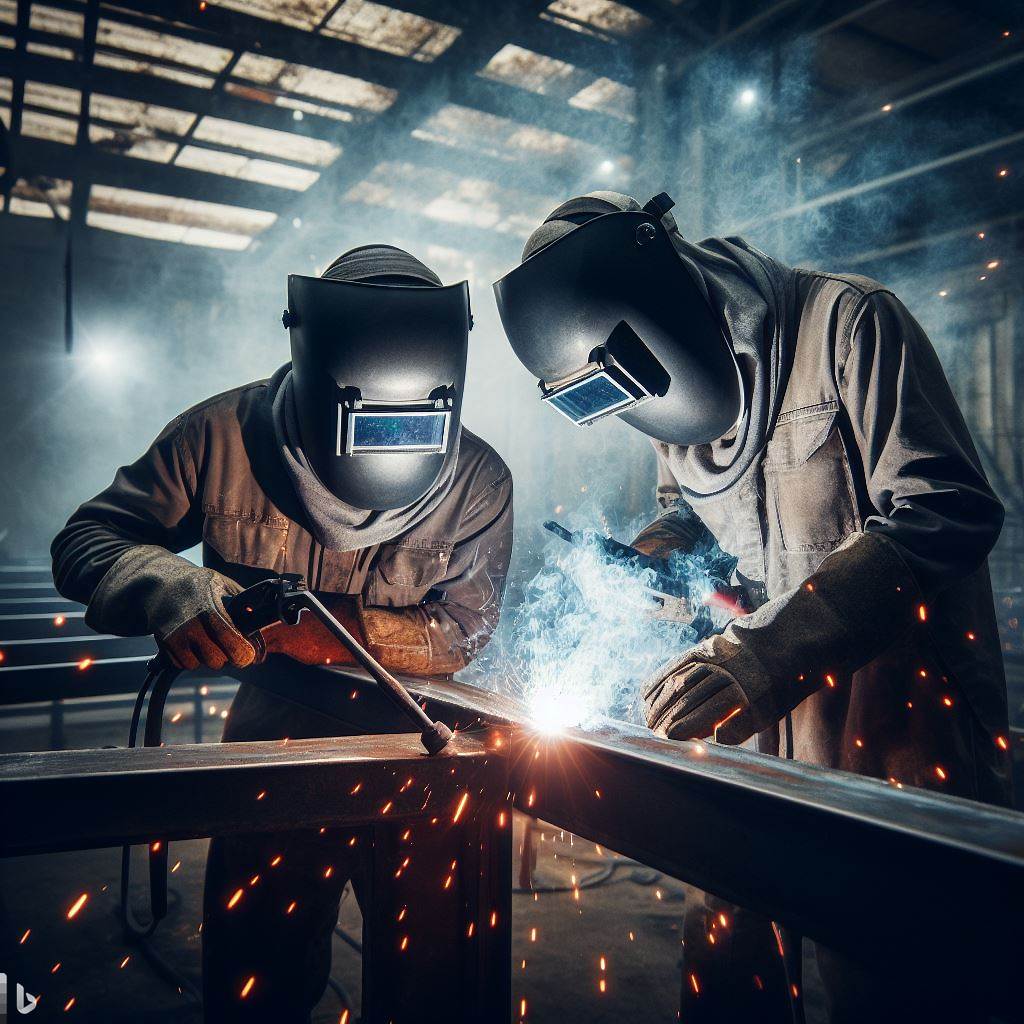Introduction
In this blog section, we will discuss the role of unions in shaping the Welder profession in the USA.
Unions have significantly influenced the evolution of the welding profession in the USA.
They played a pivotal role in advocating for workers’ rights and safety standards, contributing to the development of better working conditions.
Through collective bargaining, unions have secured fair wages and benefits for welders, further enhancing the profession’s attractiveness.
Additionally, they have been instrumental in providing training and certification programs, ensuring a skilled and competent workforce.
The ongoing role of unions remains crucial in shaping the future of the welding profession by promoting unity and advocating for better industry regulations, ultimately benefiting both welders and the broader community.
Unions play a crucial role in protecting the rights and interests of workers in the United States.
Unions in the United States have played a pivotal role in labor history.
They advocate for workers’ rights, negotiate contracts, and promote better working conditions.
Since the late 19th century, unions have been instrumental in securing fair wages, shorter workweeks, and workplace safety.
These organizations have been vital in shaping labor laws and protecting workers from exploitation.
Despite facing challenges over the years, unions continue to be a significant force in representing the interests of American workers.
The Importance of Unions in the Welder Profession
Explanation of what unions are and their purpose
Unions are organizations formed by workers in a specific industry to protect and promote their interests.
Historical context of unions in the welder profession
Unions have played a crucial role in shaping the welder profession in the United States over the years.
In the early 20th century, welders faced harsh working conditions, low wages, and dangerous environments.
To combat these issues, welders began forming unions to collectively negotiate for better conditions and fair wages.
Key benefits and protections provided by unions for welders
- Collective Bargaining: Unions negotiate with employers on behalf of workers to secure better wages, benefits, and working conditions.
- Workplace Safety: Unions advocate for safe working environments, ensuring proper training, protective gear, and regulations are in place.
- Job Security: Unions help protect welders from arbitrary terminations and unfair treatment, providing grievance procedures and representation.
- Training and Skill Development: Unions invest in the education and training of welders, ensuring they have the necessary skills for career advancement.
- Health and Retirement Benefits: Unions negotiate comprehensive healthcare coverage and retirement plans for welders.
- Legal Support: Unions provide legal assistance to welders in case of workplace disputes or discrimination.
Overall, unions are essential in safeguarding the rights and interests of welders in the United States.
They serve as a collective voice for the workforce, advocating for better conditions and ensuring fair treatment.
Without unions, welders would be more vulnerable to exploitative practices and would have limited means to improve their working conditions.
Union Influence on Welder Training and Certification
Collaboration between Unions and Vocational Schools/Training Centers
- Unions often work together with vocational schools and training centers to enhance welder education.
- This collaboration ensures that welders receive proper training to excel in the profession.
- Vocational schools and training centers benefit from the expertise and resources provided by unions.
- By working together, unions and educational institutions create comprehensive training programs for welders.
- These programs cover both theoretical knowledge and practical skills required in the welding industry.
- The collaboration ensures that training remains up-to-date with the latest advancements in welding technology.
- Students who go through these union-backed training programs often have better job prospects and expertise.
Union Apprenticeship Programs for Welders
- Unions play a significant role in offering apprenticeship programs to aspiring welders.
- These programs provide a structured path for individuals to learn and gain experience in welding.
- Apprenticeships combine on-the-job training with classroom instruction to develop well-rounded welders.
- Unions ensure that apprentices receive fair wages and benefits while they learn the trade.
- The apprentice is mentored by experienced welders who can pass down their knowledge and skills.
- Union apprenticeships also provide opportunities for networking and building connections within the industry.
- The support and guidance offered through these programs enable apprentices to become successful welders.
Role of Unions in Setting Industry Standards and Certification Requirements
- Unions play a crucial role in shaping industry standards and certification requirements for welders.
- They advocate for higher quality and safety standards to protect the interests of welders.
- Unions work with regulatory bodies to establish certifications that validate a welder’s skills and knowledge.
- By setting strict certification requirements, unions ensure that only competent welders are employed.
- These certifications act as a guarantee of a welder’s competence and proficiency in the field.
- Unions also push for continuous professional development for welders to maintain their certification.
- Being part of a union helps welders stay updated with evolving industry standards and techniques.
In essence, unions have a significant impact on the training and certification of welders in the USA.
Transform Your Career Today
Unlock a personalized career strategy that drives real results. Get tailored advice and a roadmap designed just for you.
Start NowThrough collaboration with vocational schools and training centers, unions ensure that welders receive comprehensive education and stay updated with industry advancements.
Union apprenticeship programs provide aspiring welders with structured training, fair compensation, and opportunities for networking.
Additionally, unions actively participate in setting industry standards and certification requirements, ensuring the competence and safety of welders.
Being part of a union offers numerous advantages for welders, further enhancing their professional development and career prospects.
Read: The Evolution of Welding in the USA: A Historical Overview
Collective Bargaining and Negotiating for Welders’ Rights
Overview of collective bargaining agreements in the welding industry
- Collective bargaining agreements are contracts negotiated between unions and employer organizations.
- These agreements define the terms and conditions of employment for unionized workers.
- In the welding industry, collective bargaining agreements play a significant role in shaping the profession.
- They establish standards related to wages, benefits, working hours, safety regulations, and job security.
- These agreements ensure that welders have a say in their working conditions and receive fair treatment.
Issues that unions have fought for on behalf of welders
- Unions have fought for improved safety standards in welding workplaces.
- They have advocated for proper training and certification requirements for welders.
- Unions have battled against discriminatory practices and provided safeguards against workplace abuses.
- They have demanded fair compensation for overtime work and hazardous assignments.
- Unions have fought to secure pension plans and healthcare benefits for welders.
Impact of unions on welder wages, benefits, and working conditions
- Unions have significantly influenced welder wages by negotiating fair pay scales.
- Through collective bargaining, unions have secured better health insurance coverage for welders.
- They have fought for retirement plans, ensuring welders have financial security after their careers.
- Unions have advocated for reasonable working hours and overtime pay, preventing exploitation.
- They have improved working conditions by setting safety regulations and enforcing proper equipment usage.
Overall, unions have proven instrumental in shaping the welder profession in the USA.
Collective bargaining agreements have allowed welders to have a voice in determining their employment terms and ensuring their well-being.
By fighting for fair wages, better benefits, and improved working conditions, unions have enhanced the lives of welders across the country.
Read: Top 10 Cities for Welders in the USA: Where to Work?

Union Advocacy for Safety and Occupational Health in Welding
Union initiatives to improve safety standards and regulations for welders
- Unions push for stricter safety regulations to protect welders from workplace hazards.
- They advocate for proper training and certification programs to enhance welders’ skills and knowledge.
- Unions work with government agencies and employers to establish safety protocols and guidelines.
- They organize campaigns to raise awareness about potential health risks in the welding profession.
Role of unions in addressing workplace hazards and promoting occupational health
- Unions negotiate for the implementation of effective safety measures, including proper ventilation systems.
- They ensure that welders have access to personal protective equipment (PPE) and enforce its usage.
- Unions conduct regular inspections of work environments to identify and address potential hazards.
- They provide resources and support to welders who experience work-related injuries or health issues.
Examples of successful union efforts to protect welders’ well-being
- The International Brotherhood of Boilermakers successfully advocated for the reduction of harmful fumes in welding processes.
- The United Steelworkers union played a key role in establishing regulations to minimize the risks of welding-related eye injuries.
- The International Association of Bridge, Structural, Ornamental, and Reinforcing Iron Workers improved safety standards in welding through collective bargaining agreements.
- The American Welding Society collaborated with unions to develop comprehensive welding safety guidelines for the industry.
Unions have been instrumental in promoting safety and occupational health within the welding profession in the USA.
Their initiatives have led to improved regulations, stricter safety standards, and enhanced protection for welders.
Through negotiation, advocacy, and collaboration, unions have successfully addressed workplace hazards and promoted a healthier working environment for welders.
Read: Comparing Salaries: Welder Income Trends Across US States
Challenges and Controversies Surrounding Unions in the Welder Profession
Criticisms against union influence on the profession
- Unions are often criticized for restricting individual welders’ ability to negotiate their own wages and benefits.
- Detractors argue that unions create a sense of entitlement among welders, leading to complacency and reduced productivity.
- Some feel that unions prioritize the interests of their members over the overall growth and competitiveness of the profession.
- Unions have been accused of fostering a culture of resistance to change and innovation within the welding industry.
- Opponents argue that unions create unnecessary bureaucracy and red tape that stifles efficiency and hampers business growth.
Possible conflicts between unions and employers
- One major conflict centers around wage negotiations, with unions pushing for higher pay while employers seek to control labor costs.
- Disagreements over working conditions, such as hours, safety regulations, and leave policies, can lead to tension between unions and employers.
- Unions often advocate for job security measures, which can clash with employers’ need for flexibility in hiring and firing.
- The use of subcontractors or non-unionized workers by employers can be a source of contention with unions.
- Differences in priorities and perspectives between unions and employers can lead to disputes over the implementation of new technologies and practices.
Perspectives on the future of unions in shaping the welder profession
- Supporters argue that unions play a vital role in protecting the rights and interests of welders, ensuring fair treatment and representation.
- Unions are seen as essential in maintaining industry standards and certifications, ensuring a high level of professionalism among welders.
- Some believe that unions can be a driving force for positive change within the welding profession, pushing for better training and safety regulations.
- Unions may continue to shape the profession by advocating for improved working conditions, including better wages and benefits.
- Changes in labor laws and shifts in societal attitudes towards workers’ rights may impact the future role of unions in shaping the welder profession.
In general, unions in the welding profession face various challenges and controversies.
Critics argue that unions limit individual negotiation power, foster complacency, and hinder industry growth.
Conflicts between unions and employers emerge from wage negotiations, working conditions, job security, and technological advancements.
However, supporters believe unions are essential for protecting workers’ rights, maintaining standards, and driving positive change in the profession.
The future of unions in shaping the welder profession will depend on labor laws and evolving societal attitudes towards workers’ rights.
Read: Safety Protocols Every US Welder Must Know and Follow
Showcase Your Business Today
Reach thousands of readers actively exploring professional services. Publish your business profile and grow your audience now.
Publish NowConclusion
Recap of the importance and impact of unions on the welder profession
Throughout history, unions have played a crucial role in shaping the welder profession in the USA.
They have fought for better working conditions, fair wages, and improved safety standards, ensuring the well-being of welders.
By advocating for their rights, unions have empowered welders to have a stronger voice and negotiate better agreements with employers.
The collective bargaining power of unions has resulted in improved job security and access to healthcare benefits for welders.
Additionally, unions have facilitated the professional development of welders by offering training programs and certifications, enhancing their skills and making them more competitive in the job market.
Unions have had a significant impact on the welder profession, elevating it to new heights and improving the lives of countless welders across the country.
Final thoughts on the role of unions in shaping the welder profession in the USA
The role of unions in shaping the welder profession in the USA cannot be overstated.
They have been instrumental in securing better working conditions, fair compensation, and improving the overall quality of life for welders.
Without unions, welders might have been subject to exploitation and unsafe working environments.
Unions have not only protected the rights of individual welders but also fostered a sense of unity and solidarity within the profession.
Through their collective efforts, unions have elevated the status of welders and ensured their continued relevance in the ever-evolving job market.
Looking ahead, it is vital to recognize and support the ongoing work of unions in shaping and safeguarding the welder profession for future generations.
[E-Books for Sale]
The Big Book of 500 High-Paying Jobs in America: Unlock Your Earning Potential
$19.99 • 500 High-Paying Jobs • 330 pages
Explore 500 high-paying jobs in America and learn how to boost your career, earn more, and achieve success!
See All 500 High-Paying Jobs of this E-Book
1001 Professions Without a Degree: High-Paying American Jobs You Can Start Now
$19.99 • 1001 Professions Without a Degree • 174 pages
Discover 1001 high-paying jobs without a degree! Unlock career tips, skills, and success strategies for just $19.99!




